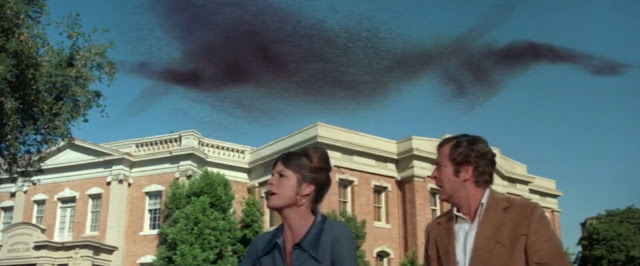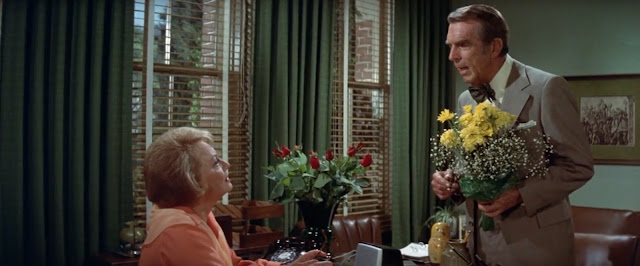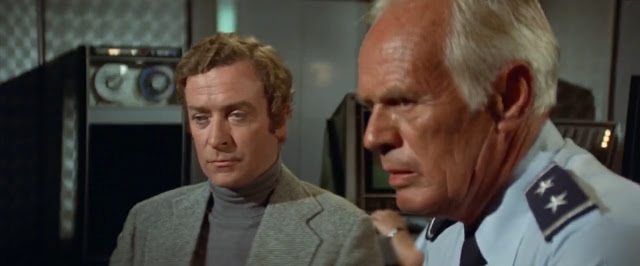 |
| Michael Caine and Katharine Ross try to save a Texas town from an invasion by killer bees. |
Release Date: July 14, 1978. Running Time: 116 minutes (theatrical), 155 minutes (extended). Screenplay: Stirling Silliphant. Director: Irwin Allen.
Note: This review is based on the 155 minute extended version.
THE PLOT:
When a missile base in Texas goes silent, military forces under the command of General Slater (Richard Widmark) investigate. A team in full hazmat suits goes in, ready for anything. What they find are the dead bodies of the base personnel and a single, unarmed civilian: Dr. Bradford Crane (Michael Caine), an entomologist claiming to be on the trail of a swarm of bees.
Slater and his second-in-command, Major Baker (Bradford Dillman), are naturally suspicious of this outsider. But the base's surviving doctor, Helena Anderson (Katharine Ross), confirms that they were invaded by bees. The bees attacked suddenly, leaving only a few survivors that she's been tending to, and then just as abruptly left.
More information comes in that supports Crane's account. Two of Slater's helicopters spot the swarm - and then are downed by it. Then a couple from the nearby town of Marysville are stung to death during a picnic, with only their young son Paul (Christian Juttner) surviving.
This is abnormal behavior for bees, and the reactions of Paul and the surviving soldiers to just a few stings is even more abnormal, leading Crane to conclude that these are African "killer" bees. Soon, Crane has been placed in charge of a team of scientific experts working out of the base, with Slater answerable to him - an arrangement that sits poorly with the general.
And as the two men struggle with each other over the best response to this crisis, the bees prepare their next, even more devastating attack!
 |
| Dr. Crane gives a briefing on the bee invasion. |
CHARACTERS:
Dr. Bradford Crane: In a movie filled with things that don't work, the single most damaging element is... Michael Caine. Caine is no stranger to bad movies; but he usually makes them better, whereas here he actively makes the film worse. He recites his lines in a dead-eyed monotone, seeming to not quite believe the words that are coming out of his own mouth. Occasionally, a scene will call for Dr. Crane to be assertive - which results in Caine shouting, but with just as little emotion as he puts into his monotoning. Acknowledging that I haven't seen every turkey Caine has made, I nevertheless strongly suspect that this marks his career worst performance.
Helena: A doctor assigned to the base. She used to be Marysville's town doctor, and she knows Paul and his family well. Despite being career military - at least, judging from the various ornamentations on her uniform - and despite having military patients during a full-fledged crisis, she is apparently allowed to leave the base at will to go chasing after Paul on multiple occasions. She also has no problem sniping at a superior officer at one point to defend Dr. Crane. Oh, and she ends up in a chemistry-free relationship with Crane on the general principle of "we're both relatively young and attractive, so why not?" Katharine Ross seems to be taking inspiration from Michael Caine in that, like him, her lines are mostly delivered in a monotone with a blank facial expression.
Gen. Slater: With Caine and Ross trying to out-robot each other, it falls to the supporting cast to carry the movie. Slater isn't particularly better-written than the two leads. This was the '70s, so a career military man in a movie was pretty much automatically an idiot. For two full hours, Slater's role is to be reliably wrong at every turn while also being paranoid about Dr. Crane - only to, in the final half hour, suddenly develop respect for Crane for no particular reason. Though the role isn't good, Richard Widmark pours full energy into it. He spits, sneers, and chews on every line, devouring his cheesy dialogue like it's particularly well-cooked prime rib. The results are more than a little hammy - but given the material, a bit of ham is called for, and at least Widmark is fun to watch.
Dr. Krim: The great Henry Fonda gives postcard glimpses of what The Swarm might have looked like if it had been a good movie. Fonda's body language and expressions create responses that aren't really present in the script, from the way he sits in the midst of the bodies of the dead soldiers to the grave look he gives when the father of one of the men comes to claim his son's body. Even setting aside Fonda's performance, the character is more human on the page. He grouses about the food, wondering "what the hell does a man have to do to get a simple beer and pizza," and he interacts better with the military - respectful even when voicing disagreement. He even gets the film's one "hero" moment - and had he been the lead, this would automatically be a better (well, less bad) movie.
Major Baker: Bradford Dillman, a good actor who got typecast as weasels, plays Crane's military liaison - who is, yes, a weasel. He's ordered by Slater to keep an eye on Crane. This does not in itself make him bad. But the way he tries to get Krim to say something negative about Crane is pure snakelike behavior, and he slithers off the instant Krim shoots down his effort. He later tries to toady up to Slater by making comments about Crane behind his back - resulting in Slater giving him a firm verbal kicking. Dillman makes the most of his screen time, making Baker twitchy and, in his interactions with Helena, even a bit lascivious. He gets verbal slaps from, at various points: Crane, Krim, Slater, and Helena. After so much verbal battery, his eventual death by bee might well qualify as a mercy killing.
Maureen, Felix, and Mayor Tuttle: With killer insects threatening the countryside, you might think we have enough plot for one bad movie. But Irwin Allen needs his subplots, and so we are graced with a senior citizens' love triangle among Olivia de Haviland, Fred MacMurray, and Ben Johnson. The three actors do what they can, and MacMurray manages a few moments that are genuinely endearing and humorous. But this entire subplot goes nowhere, has nothing at all to do with the story, and is abruptly cut off about an hour from the end. To add to the waste of these great actors, this would be Fred MacMurray's final performance. The man who starred in Double Indemnity, a contender for classic Hollywood's greatest film noir, and who would go on to create a memorably multi-faceted sleazebag in The Caine Mutiny, would end his career with... this.
Various Cameos: Slim Pickins gets a genuinely good scene as a grieving father. He's only on screen for about five minutes, but he makes an impression - which is more than can be said for most of the rest of the all-star cast. Richard Chamberlain is present a fair amount, but he doesn't actually do anything. Had his lines been split between Caine and Fonda, I doubt anyone would notice his absence. Lee Grant pops up as a television reporter in another bit that adds nothing and goes nowhere. Patty Duke appears just long enough to officially be in the movie and manages to do even less than Lee Grant. Finally, José Ferrer's cameo is so out-of-nowhere that I actually started laughing when he appeared. With the exception of Pickins, all of these bits should have been cut, both to reduce the overlong run time and to tighten up the script.
 |
| Dr. Krim (Henry Fonda) begins his work amidst literal piles of the dead. |
THOUGHTS:
"I never dreamed that it would turn out to be the bees. They've always been our friend."
-Dr. Bradford Crane (Michael Caine). Perhaps he expected an invasion of fire ants instead. Or possibly mosquitoes.
The Swarm is an infamously bad movie. Producer Irwin Allen had pushed through such previous mammoth productions as The Poseidon Adventure and The Towering Inferno, and this was clearly meant to be another "big" film - big budget, filled with big names, big set pieces, and more big 'splosions than one would reasonably expect in a movie about bees.
It turned out to be a big bomb, and its failure was a sign that audiences were growing weary of disaster epics. It would take a few more years for the genre to truly die, but The Swarm seems to mark the moment that the disaster film's fortunes turned.
The movie opens surprisingly well, with the hazmat-suited military team exploring the base and finding the bodies of the dead. Stirling Silliphant's script moves quickly from there to establishing the basic situation, with Dr. Crane put in charge of the response and making the base his command center by the twenty-minute mark. The pieces are in place for a decent little thriller.
Unfortunately, Irwin Allen made the choice to direct the film himself. Allen was a skilled producer, adept at securing generous budgets, gathering talent, and finding opportunities to publicize his A-list shlock into "Events." But he wasn't a film director, and this shows constantly throughout the movie.
Scenes are awkwardly blocked, with actors standing in positions that seem designed mainly to fit as many faces into the frame as possible. Many scenes have dead spaces, with shots running for full seconds after they should have cut. Pacing is erratic, even within the set pieces, and there are bizarre gaps in the storytelling. During a bee attack, Michael Caine and Katharine Ross get trapped in a freezer. Cut to later, and they're out and about again, with their release from that freezer unshown and not even filled in with a throwaway line.
Then there's the dialogue, which leads to...
 |
| The hilarious giant bee hallucination - and this isn't the only one in the movie! |
AN ACCIDENTAL COMEDY CLASSIC:
"Will history blame me or the bees?"
-Gen. Slater (Richard Widmark) in a moment of contemplation.
When the dialogue branches out from exposition, it tends to land on accidental comedy. I've already cited "the bees have always been our friend," but there are several similarly hilarious bits. Caine gets the worst of them, such as when Dr. Crane snaps to Gen. Slater that the bees "are killing Americans, without reference as to whether or not they have a serial number and expected to salute you!" Katharine Ross also briefly discards robot mode for 1950s melodrama as, distraught after an attack, Helena cries out to Dr. Crane: "My God, Brad, what good is all that science? All that equipment at the base? All those doctors? What good are YOU!?!"
Unintended comedy doesn't stop with the dialogue. The bee attacks should be horrifying, people writhing in agony as they are stung to death. Instead, they become hilarious, the victims looking not like terrified people in agony, but instead like street performers putting on an interpretive dance show. Double the camp value anytime the deaths play out in slow motion.
Then there are the hallucinations. Paul, recovering in the hospital, can't focus on Dr. Crane or Helena, because all he sees is the image of a giant killer bee. This might be disturbing if what we saw was just Paul's reaction to the hallucination as the others try to snap him out of it. Instead, Irwin Allen insists on showing us the giant bee, which at one point floats beside Michael Caine's shoulder. The effect is... um, probably not what was intended.
It's all capped off with a climax involving hazmat-suited soldiers fighting the bees street by street using flamethrowers. One unlucky soldier doesn't merely die - He gets covered in bees, then set aflame, then falls through glass, then plunges to the ground below. When he finally hits the bottom, I half-expected him to explode just to complete the overkill.
 |
| Fred MacMurray proposes to Olivia de Haviland in a scene that feels like it's from a different movie. |
VERSIONS:
The Swarm was theatrically released with a running time of 116 minutes. The DVD, blu-ray, and streaming releases tend to favor the 155 minute extended cut, though some disc versions do include the theatrical version as well.
Reading up on the differences at movie-censorship.com, I'd say the theatrical cut is likely better from a dramatic standpoint, trimming down some of the longer scenes and paring back on some of the subplots. However, I'd still recommend the extended version for one big reason: The comedy.
The editors must have been trying to "save" The Swarm as a thriller, because the theatrical cut discards most of the comically cheesy dialogue. The quotes I've mentioned for Michael Caine and Katharine Ross? They're exclusive to the extended cut.
As a result, the theatrical version is probably "less bad" as a thriller - but the melodramatic dialogue makes the longer version a lot funnier.
 |
| Dr. Crane and Gen. Slater (Richard Widmark) clash over the best response to the killer bee crisis. |
OVERALL:
"The African killer bee portrayed in this film bears absolutely no relationship to the industrious, hard-working American honey bee to which we are indebted for pollinating vital crops that feed our nation."
-The title card assures us that our good American bees are nothing like those darn foreign bees.
The film repeatedly notes how little the swarm's behavior resembles that of American bees. Beyond that, their behavior (and toxicity) is completely different from actual Africanized bees, something which is lampshaded in a briefing scene... only for the movie to continue referring to the bees as "African" for the remainder of the running time. Really, this is some mutant strain that is so hyperintelligent and so resistant to all normal means of pest control that if one replaced every use of the word "bee" with "space alien," the script would actually seem more plausible and would make more sense!
This is both the problem and the saving grace of The Swarm. It's a terrible movie, with no internal credibility at all. It starts off with a promising structural framework, but it gets ever stupider as it goes along, and poor directorial choices result in potential moments of tension becoming unintentionally funny.
Still, I will say this: It's not only watchable; when viewed in the right frame of mind, it's thoroughly entertaining. I had a great time with The Swarm, cackling at the dialogue, at the combination of hammy acting and robot acting, and at the over-the-top death scenes.
So in the end, a sort of split recommendation. By any reasonable measure, this is a dreadful motion picture. But if you're looking for a fun "B" movie to laugh at, then this might just be worth a glance.
Overall Rating: 3/10. Bad enough to justify a "1" - but I just had too much fun watching it.
Review Index
To receive new review updates, follow me on Twitter:
Follow @RandomMusings09
No comments:
Post a Comment